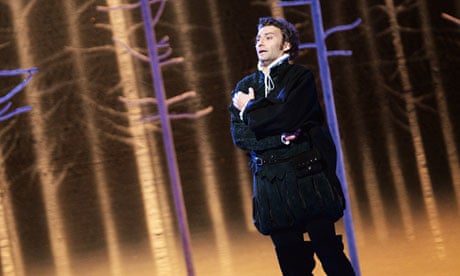In Verdi's four-and-a-half-hour opera Don Carlo, one moment captures its essence. The Grand Inquisitor, blind and venomous, totters into the study of the Spanish monarch, Philip II. Two elderly men confront the limits of their power: kingship versus faith, dogmatism, contrition and the lonely terror of old age. The music begins black and hushed – low strings, unearthly bassoons – and slowly unfurls to quaking magnificence. A depressed and loveless Philip acknowledges the dominance of this raging man of God, swathed in clerical silks and, as played by Eric Halfvarson at the Royal Opera House, hunched and monstrous like a crimson slug.
This may be the second revival of Nicholas Hytner's 2008 staging, with sumptuous designs by Bob Crowley lit by Mark Henderson, but it only gains in authority. Antonio Pappano, conducting with loving ferocity and spacious tempi, draws the classiest orchestral playing and choral work from the ROH musicians. It's worth saying that first, before we get lost in rapturous appreciation of the cast, always the talking point – even more than usually in opera, that is – in this work.
Based on Schiller's play and here performed in the Italian version, Verdi's much revised masterpiece demands world-class singers at the peak of their powers. You can't do a low-key Don Carlo. The thrill of having the German tenor Jonas Kaufmann (supply your own superlatives) in the title role is as good as it gets for opera fans. With the experienced Ferruccio Furlanetto, pensive, surly, snide and in growling, robust voice as Philip II, and Mariusz Kwiecien as Rodrigo/Posa, the balance of male voices worked beautifully. This Polish baritone has a freshness of manner and flexibility of tone which make him especially touching in his portrayal of Carlos's loyal friend.
They were deft in their celebrated duet, an almost crooning close harmony ballad in which Verdi cleverly makes the two voice types – tenor in descent, baritone rising – meet on one note, a symbol of undying friendship. Carlos is a tricky role, buffeted by circumstance, responding rather than determining events. Whereas Rolando Villazón, who sang when the staging was new, goes for febrile, almost quivering intensity, Kaufmann has a stillness and air of containment, equally compelling. This generous and serious performer rarely disappoints.
Anja Harteros, as Elizabeth of Valois, received rave reviews for her first-night performance. I missed her. By Wednesday she was out with tonsillitis, replaced by Lianna Haroutounian, due anyway to take over the role this week. So the Armenian soprano made her Royal Opera debut early to thundering applause. Petite and vulnerable in manner, she brought humanity to a part which can seem chilly. If at times her voice seemed confined, by her final outpouring as she bids farewell to her beloved Carlos, she suddenly let rip. This chimes with the demands of text and music: until that point, she is forced to repress her feelings. Haroutounian seemed to pull forth ever-increasing vocal powers until you thought her heart, or yours, would burst.
By chance another Grand Inquisitor was prowling around last week, not in Covent Garden where he has taken the role in this production with Kaufmann, but on the English south coast. John Tomlinson sang an extract from Don Carlo, with fellow bass Michael Druiett as Philip II, at a weekend festival in Eastbourne called Gods and Heroes. The theme was this year's three anniversary composers – Wagner, Verdi and Britten – with performances by younger singers who are continuing their training thanks to support from Mastersingers, a foundation which particularly helps those moving into Wagnerian repertoire.
As Tomlinson sang Wotan at Covent Garden and Bayreuth for two decades, as well as the world over, he has a jot of experience. Lee Bisset and Stuart Pendred, both in the cast of Longborough's Ring Cycle next month, sang extracts from The Flying Dutchman. Druiett, Opera North's Wanderer in their forthcoming Siegfried, worked on the role with Tomlinson in a public masterclass. The tradition of British Wagner singing, passed from Reginald Goodall to Tomlinson and his generation, continues on its exciting journey down the Rhine. With the emphasis firmly on music, it feels worlds away from the stampedes and protests at Düsseldorf's "Nazi" Tannhaüser last week.
I have a memory of the composer Steve Martland, who died last week aged 53. A perpetual rebel, he and the BBC were not friends in the late 1980s. He believed Radio 3 had banned his music. In 1992 I decided to carry a piece about him in the first issue of BBC Music Magazine, which I was editing. He was wary. Why did we want to write about him? Were we trying to stitch him up? He arrived for the photo shoot in his uniform tight white T-shirt, biceps on display – a look he maintained all his life – fully expecting to be handed a shirt and tie.
In went the piece, entitled "New music's muscle man". (We dropped a headline comparing him with Arnold Schwarzenegger.) In came the letters of complaint: muscles, T-shirts, talk of radical politics and iconoclastic music termed "drastic classicism"? What was this dire new rag? Steve was tickled. On hearing of his death, I dug out the article. It ends with these words, to which he remained true: "I see it as my duty to speak out. I'm involved with something positive – that's why I'm so militant. And that's why I must stay an outsider."

Comments (…)
Sign in or create your Guardian account to join the discussion